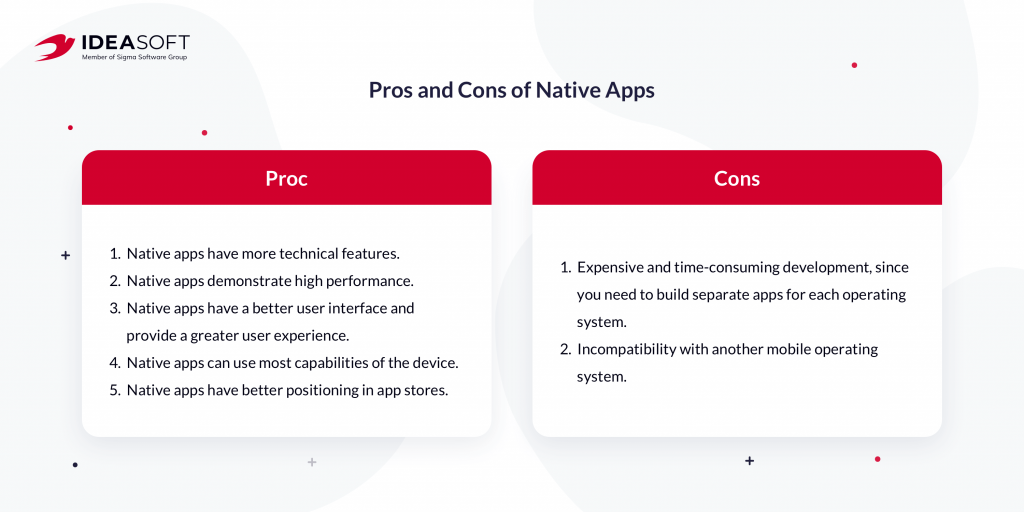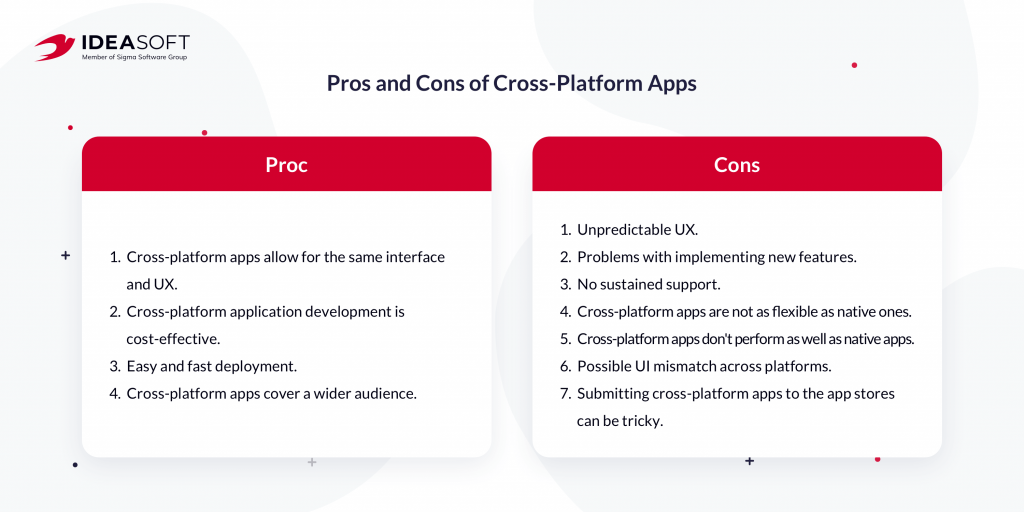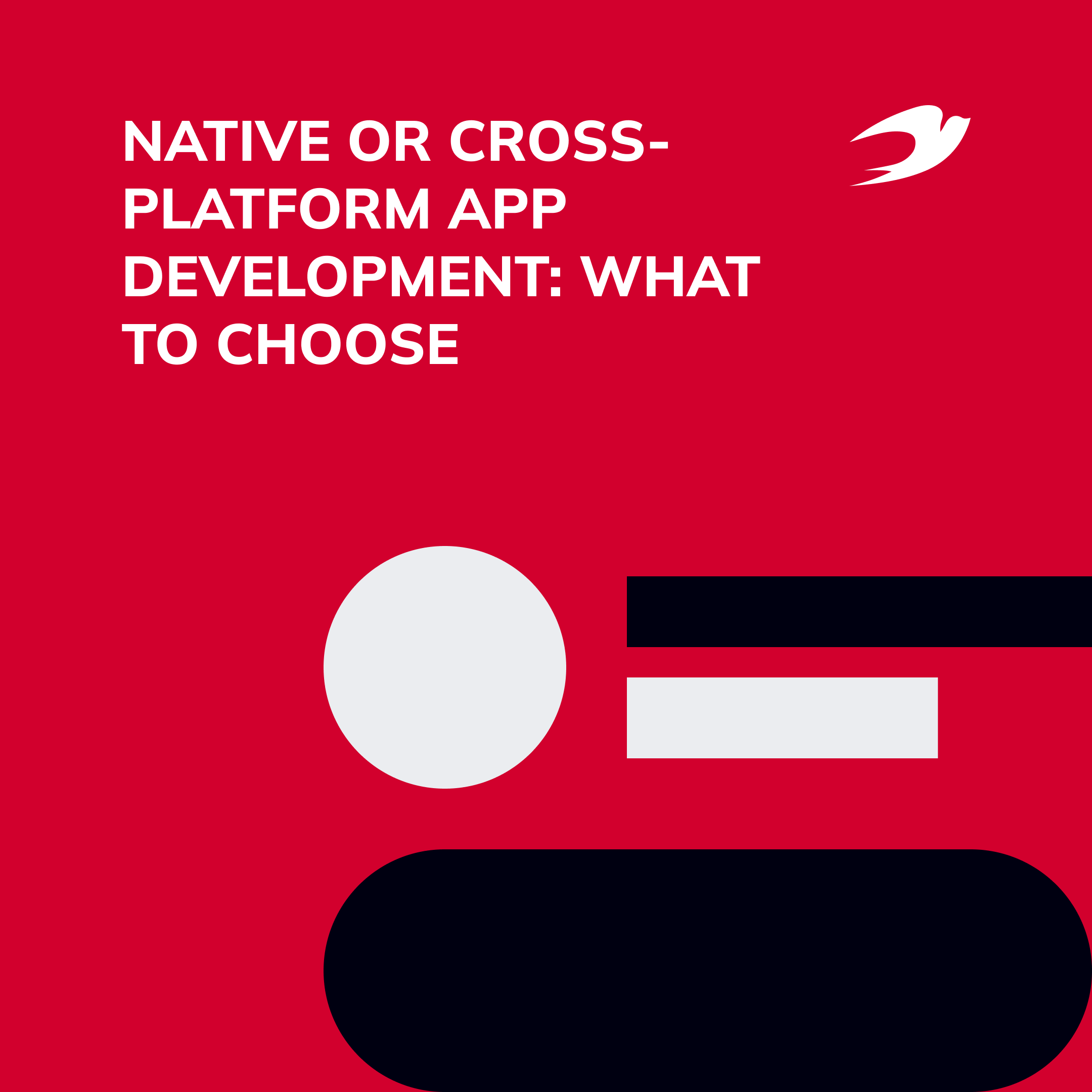According to Statista, in 2020 users downloaded 218 billion mobile apps. Moreover, in 2023, mobile apps are projected to generate more than 935 billion U.S. dollars in revenues via paid downloads and in-app advertising. With such an ever-growing market, most companies want quality, reliable applications that are also easy to update and maintain. But in fact, there is always the main question: native or cross-platform app development.
In this article, we’ll tell you the difference between native and cross-platform apps, and try to figure out if native apps are better than cross-platform ones.
Table of contents:
- Pros and cons of native apps
- Pros and cons of cross-platform apps
- Factors to consider when choosing between native and cross-platform app development
3.1 Cost
3.2 Development time
3.3 Business goals
3.4 Project complexity - IdeaSoft experience
Pros and cons of native apps
Native applications are developed for a specific operating system (Android, iOS). Such mobile app development requires a development team that has specific knowledge and programming skills for each operating system and development environment. For example, for iOS, the development is done with C++/Swift in the Xcode development environment, and for Android – with Java in the Eclipse development environment.
Native applications provide fast and high-quality interaction with the operating system, as they are tailored to the specifics of each system. Another important advantage of native apps is security. Fraudsters can’t access the data in a native app without having the necessary rights. For some companies, security is a priority, so this advantage has a great impact when a business decides what to choose: native or cross-platform app development.
The list of advantages of native apps doesn’t end there. If you develop a native app, you’ll end up with powerful functionality: a wide application menu, a variety of special effects, and interesting animations. The undeniable advantage of a native mobile application is that it can use all the functions of an operating system to the maximum – video and audio player, microphone, voice recorder, etc. Let’s take a look at the main pros and cons of native apps.

Pros and cons of cross-platform apps
Cross-platform applications are developed on the same platform, but they run on all operating systems (Android, iOS). This development approach reduces the capabilities of the application but has an advantage in terms of time and cost of development.
Today, most cross-platform applications are developed using PhoneGap, Xamarin, Titanium, Ionic, Flutter, React Native frameworks. Titanium and PhoneGap are very popular and allow developers to use HTML-CSS-JS combination to create applications and get access to geolocation, sound, and other device features.
However, despite their attractiveness in terms of price and development speed, cross-platform apps have many weaknesses and cannot always reach the level of native ones. They tend to be less flexible, harder to maintain, and less user-friendly because they don’t take into account the uniqueness of each platform. In any case, before choosing this type of mobile application development, it is worth discovering the full list of pros and cons of cross-platform apps.

Factors to consider when choosing between native and cross-platform app development
Primarily, both native and cross-platform apps are popular so there is no single correct option when choosing between native and cross-platform app development. Everything depends on the type of project and your business goals. The main factors influencing the choice of development type are the following:
- Development cost.
- Development time.
- Business goals (e.g.how important is performance, what is the budget and time to market, does access to mobile features as well as app monitoring is needed).
- Project complexity (how many features and integrations are needed).
Usually, the cross-platform approach wins in price and development time, and it is suitable for simple applications which don’t require access to the device features. Native apps are more productive and provide a better UX. They are suitable for complex projects because they take into account the features of a particular platform. However, native app development is more expensive, because developers need to create separate apps for Android and iOS.

Cost
If we talk about cross-platform apps, one team can implement an idea on all platforms at once, using a single tech stack. This results in less resource consumption. But to choose the best option, you must evaluate not the current investment in the project, but the amount of cost in relation to the time spent.
At first glance, the development of cross-platform applications seems cheaper, but the additional costs can snowball. Since the tools for cross-platform apps development are relatively new, you will need more time and money to find experienced professionals, and then you will need resources to maintain your mobile app. In addition, cross-platform development cannot fully adjust the application to the market since each platform uses unique UI elements. For example, iOS app developers have to comply with corporate requirements to get into the App Store.
Also, with a native application, it is much easier to write a competent job description and adequately estimate the cost of its development.
Development time
Cross-platform app developers don’t need to learn multiple technology stacks of different platforms before building apps. Instead, they need to be well versed in one development stack and its features. Because there is no need to create different codebases, initial deployment to target platforms is much faster. In addition, you can make future changes to the application simultaneously, without making individual changes on each platform.
Also, you need to remember that the mechanism for adding a cross-platform app to the Apple App Store and the Google Play Store is different compared to native apps. Also, the requirements are different. Passing all the tests and complying with all the rules can be really challenging and time-consuming task.
If we talk about native app development, adding two apps into the digital strategy is easier than it sounds. You just have to determine which platform your customers prefer. Suppose the iOS app needs to hit the App Store as soon as possible while the Android version can wait. A development team will concentrate all its efforts on iOS app development and when it’s done, they will start building your Android app. So, you will get high-quality apps and will not lose anything.
Business goals
A lot depends on your business goals. What markets do you want to work with? Are you looking for large coverage or are you creating a corporate application for use within your company? Do you need monetization? If so, what strategy are you planning to use? For example, statistically, in iOS apps, the subscription and in-app purchases strategy work best, while Android performs well with an ad-based model.
Cross-platform apps offer developers more opportunities to reach a wider audience because such apps reach users of all types and mobile devices, regardless of their operating system. In most cases, this is more effective for businesses than having a presence on just one platform. However, if you know that your audience prefers iPhones, for example, then of course you should focus on this particular platform.

You also have to decide how important security and productivity are to your project. For example, the development of healthcare or financial apps requires an advanced level of security, while entertainment apps focus more on performance. Nevertheless, using one universal technology stack sacrifices flexibility. Losing flexibility in development would mean losing the opportunity to improve performance.
Project complexity
The complexity of the project is determined by the number of features and application integrations. The more technology you need to use in your work, the more complex the project will be. However, it is important to make sure that the performance of the app is not affected. Complex projects are usually easier to implement on native platforms if you want to maintain a high level of performance and good UX.
If you’re building a business around a mobile app or are going to include complex animations and “heavy” graphics, also opt for native development. It allows you to make changes to the source code as quickly as possible. As well as gain access to all the capabilities of the device, automatically track the performance of the application, and improve the quality of animation and rendering. Also, it is necessary to know about mobile trends to develop the most effective and feature-rich app.
IdeaSoft experience
Each type of mobile development has its own advantages and disadvantages, so there is no clear answer, native or cross-platform app development. The choice largely depends on the specifics of your project. These factors include your business goals, budget, deadlines, project complexity, and more. In most cases, we recommend building native apps. Although native apps are more expensive, they are much better. It’s a worthwhile investment that will maximize the benefits for your business. The native approach to developing a mobile application is worth considering if:
- You want to use most functionality available on a smartphone or tablet as well as services and resources (a wide menu, animations, camera, geolocation, etc.).
- You want to get a comfortable and reliable mobile app.
- Your app needs to handle a lot of information.
In our experience, native applications are the more efficient option. They are more user-friendly, more productive, easier to update, and safer. For example, the IdeaSoft team has created native apps for Versara, Nexar, Famer. We develop apps considering all the project requirements and according to app stores’ guidelines. IdeaSoft can offer a full range of mobile app development services from UX design to testing and support.

Feel free to check out the IdeaSoft portfolio or contact us directly to discuss your next project!




